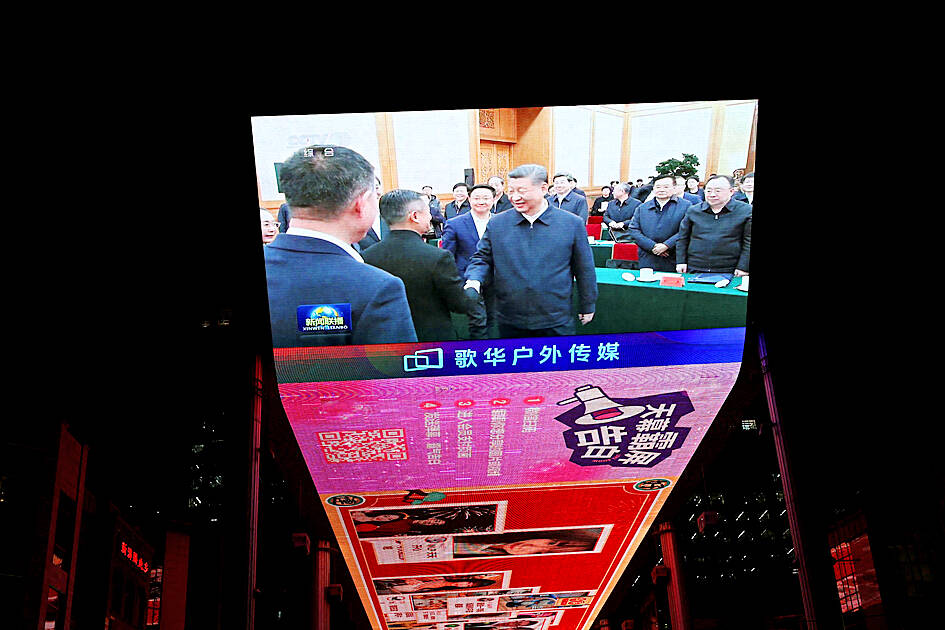Chinese President Xi Jinping (習近平) yesterday presided over a meeting with Alibaba Group Holding Ltd (阿里巴巴) cofounder Jack Ma (馬雲) and other prominent entrepreneurs, signaling Beijing’s endorsement for a long-marginalized private sector now considered key to reviving the world’s No. 2 economy.
The country’s leader drew many of the biggest names in Chinese business over the past decade, representing industries from chipmaking and electric vehicles (EVs) to artificial intelligence (AI). The summit demonstrated Beijing’s softer stance toward the private-sector companies that fuel most of the country’s economy, just as Washington ramps up a potentially debilitating campaign of global tariffs.
Xi delivered a speech after listening to representatives of firms including Ma, Meituan (美團) cofounder Wang Xing (王興) and Xiaomi Corp (小米) chief executive officer Lei Jun (雷軍), Chinese state media reported.

Photo: Florence Lo, Reuters
Also present were Unitree Robotics (宇樹) founder Wang Xingxing (王興興) and Huawei Technologies Co (華為) founder Ren Zhengfei (任正非) — considered key figures in China’s ambition to reduce its reliance on US technology.
Tencent Holdings Ltd (騰訊) founder Pony Ma (馬化騰) — whose WeChat pioneered the “super app” concept that has since been lauded by Elon Musk — attended, a person familiar with the meeting said.
BYD Co (比亞迪) founder Wang Chuanfu (王傳福) and Contemporary Amperex Technology Co Ltd (寧德時代) founder Robin Zeng (曾毓群) also joined the assembly, driving home China’s rapid ascent in EVs.
“This is the strongest signal China could release to boost social confidence. The fact that Xi Jinping himself shows up to meet with the entrepreneurs highlights the political significance of this meeting,” Singapore University of Social Sciences School of Law senior lecturer You Chuanman (游傳滿) said.
Authorities have taken a less combative approach more recently as China’s economy slowed and companies aligned themselves with Xi’s push for leadership in areas such as AI.
Alibaba’s Qwen (通義千問) model has performed well in official benchmark tests and signaled the company’s growing relevance in the field, while Apple Inc is incorporating its AI technology into Chinese iPhones, a vote of confidence in its growing prowess in the field.
“It’s an enabling policy rather than a 180-degree shift,” You said. “China has been pivoting from over-regulation on the property market and private sector before COVID[-19] to releasing positive policy signals to the private economy. We’ve seen a continuing shift in tone from Beijing toward the private sector: tolerance, improvement and encouragement.”
It remains unclear to what extent authorities plan to shift their stance toward the private sector. A show of support by Xi would almost certainly add fuel to the stock-market rally and revive animal spirits among entrepreneurs, but much would depend on whether authorities follow through with more concrete policy actions.

NEW IDENTITY: Known for its software, India has expanded into hardware, with its semiconductor industry growing from US$38bn in 2023 to US$45bn to US$50bn India on Saturday inaugurated its first semiconductor assembly and test facility, a milestone in the government’s push to reduce dependence on foreign chipmakers and stake a claim in a sector dominated by China. Indian Prime Minister Narendra Modi opened US firm Micron Technology Inc’s semiconductor assembly, test and packaging unit in his home state of Gujarat, hailing the “dawn of a new era” for India’s technology ambitions. “When young Indians look back in the future, they will see this decade as the turning point in our tech future,” Modi told the event, which was broadcast on his YouTube channel. The plant would convert

‘SEISMIC SHIFT’: The researcher forecast there would be about 1.1 billion mobile shipments this year, down from 1.26 billion the prior year and erasing years of gains The global smartphone market is expected to contract 12.9 percent this year due to the unprecedented memorychip shortage, marking “a crisis like no other,” researcher International Data Corp (IDC) said. The new forecast, a dramatic revision down from earlier estimates, gives the latest accounting of the ongoing memory crunch that is affecting every corner of the electronics industry. The demand for advanced memory to power artificial intelligence (AI) tasks has drained global supply until well into next year and jeopardizes the business model of many smartphone makers. IDC forecast about 1.1 billion mobile shipments this year, down from 1.26 billion the prior

People stand in a Pokemon store in Tokyo on Thursday. One of the world highest-grossing franchises is celebrated its 30th anniversary yesterday.

Zimbabwe’s ban on raw lithium exports is forcing Chinese miners to rethink their strategy, speeding up plans to process the metal locally instead of shipping it to China’s vast rechargeable battery industry. The country is Africa’s largest lithium producer and has one of the world’s largest reserves, according to the US Geological Survey (USGS). Zimbabwe already banned the export of lithium ore in 2022 and last year announced it would halt exports of lithium concentrates from January next year. However, on Wednesday it imposed the ban with immediate effect, leaving unclear what the lithium mining sector would do in the